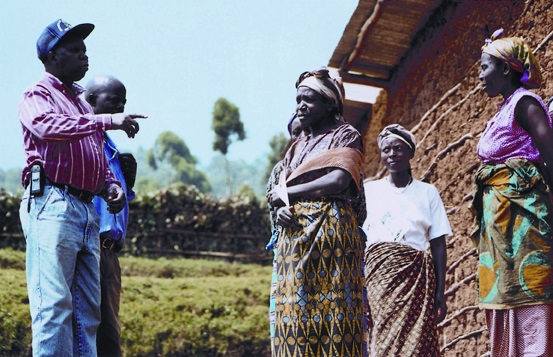In her efforts to make the application of the Participatory Market Chain Approach (PMCA) on orange-fleshed sweetpotato (OFSP) value chains more gender responsive, Sarah Mayanja, a Regional Research Assistant with CIP in East Africa, draws upon CGIAR resources and her own experiences to help women take a more active role in in those chains.
Over the past year, Sarah Mayanja, an agricultural market specialist working to improve smallholder innovation and market access in Kenya, Tanzania and Uganda under CIP’s Sweetpotato for Profit and Health Initiative (SPHI), has made a special effort to get women to take a more active role in the project and their organizations. She and her supervisor, Margaret McEwan, have undergone gender coaching through Agri-ProFocus, a Dutch-funded professional network, while taking advantage of tools and support from the CGIAR Gender and Agriculture Research Network. Mayanja also draws upon her own experiences as a woman in a male-dominated field, and the mentoring she received from a male professional several years ago.
“I wasn’t that gender sensitive before. I used to look at the numbers, but not the qualitative issues that would really be a measure of gender empowerment,” said Mayanja, who uses the PMCA to help East African smallholders to earn better incomes. “I’m very, very interested in this now.”
As part of SPHI efforts to promote the farming and consumption of bio-fortified, orange-fleshed sweetpotato varieties, Mayanja works with national agricultural institutions, non-governmental organizations, farmer organizations, the private sector and other market participants. She helps them to better understand local value chains for sweetpotato, identify market opportunities, and develop business plans for exploiting them. While the approach has been effective, Mayanja and McEwan found that women are often marginalized in the process. The two consequently sought help from Agri-ProFocus, and their colleagues at CIP and CGIAR, to make the approach more gender responsive.

Women potato farmers in Nyamiyaga, Kabale
They attended an Agri-ProFocus workshop and were assigned a gender coach who has helped them to ‘engender’ the PMCA, using gender analytical tools. For example, the gender mapping tool and the gender constraints analysis tools can help thematic groups to (i) identify impediments that may hinder women and men to engage in market opportunities and (ii) develop strategies to overcome them, and integrate them in business plans that are more gender equitable. Nevertheless, the social dynamics in East Africa make it a challenge to get the groups’ female members to take an active role in the process.
“The women are there, but the issue is whether they are participating. They may come to the meeting, but they often keep quiet,” Mayanja said. “The challenge is to ensure that women are not only participating in, but are also benefiting from the project.”
She explained that this is no small task, since even when a meeting has a female facilitator, the men sit in the wings and retain the authority. “You can see that the women facilitators are very enthusiastic, and they want to try out the new ways that are suggested, but the men may still cling to the old way of doing things,” she observed.
Mayanja admitted that it is frustrating, but she is familiar with the dilemma of the women in the groups she works with, since she has faced comparable problems over the years. She explained that her situation improved after she received a fellowship from the African Women in Agriculture Research and Development (AWARD) program a few years ago, when she was connected with a mentor who helped her define her ‘life purpose road map’ and advance in her career.
“I sometimes reflect on my own experience and it helps me to mentor the women facilitators, especially the younger ones,” she said. “Every time I see they are faltering, or that they are having problems, I can talk to them, I can have a one-on-one with them. I always show them that I am open and that all they need to do is let me know and I’ll be available.”
Mayanja explained that she has gotten plenty of advice and support from people at CIP, especially Margaret McEwan, her supervisor, Gordon Prain, Science Leader for Social and Health Sciences, and RTB Director Graham Thiele, as well as the CGIAR Gender and Agriculture Research Network.
“I’ve learned a lot about what others are doing and how they’ve been able to address situations like these, so I don’t just feel like this is a battle I’m running alone,” she said.
